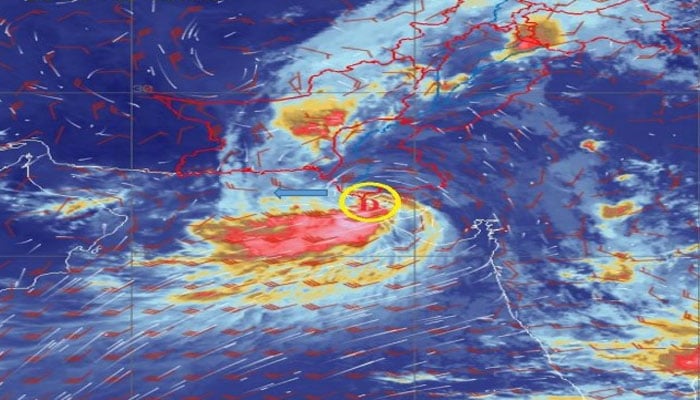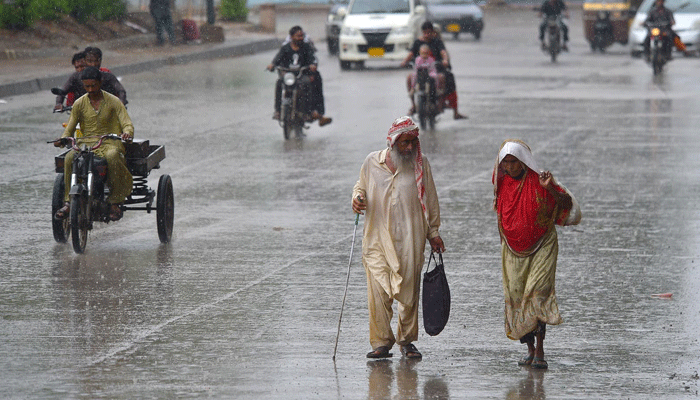Coastal areas on cyclone alert with deep depression 120km away from Karachi
Met Office expects Karachi to experience heavy rainfall with strong winds and thundershowers in next 24 hours
KARACHI: The deep depression, which is gradually moving towards the Arabian Sea from India's Rann of Kutch, is now 120 kilometres southeast of the port city, the Pakistan Meteorology Department (PMD) warned Friday.
In its latest alert regarding the deep depression, the PMD said that the low-pressure area is now located approximately 120 kilometres southeast of the port city.
It further stated that it lies around Latitude 23.8 N & Longitude 66.6 E at about 120km south of Karachi, 180 southwest of Thatta, 250km southeast of Ormara and 440km east-southeast of Gwadar.
It is expected to move west-southwestward along Sindh's coastal belt and may intensify into a cyclonic storm upon entering the Arabian Sea by today afternoon or evening, subject to favourable environmental conditions.
PMD Director General Mehar Sahibzada Khan said in a press conference that the cyclone namely Asna brewed off the Karachi-Gwadar coast which may result in heavy rainfalls after hitting western coastal areas.
"Cyclones usually advance from sea to land but Asna's advancement is vice versa [...] It will intensify into a hurricane whose impacts will be seen in the next week," he added.
"Our country is receiving more than usual downpours due to this cyclone. Upper areas of the country will experience more rain from September 2 to 4."
Mehar predicted that the weather conditions would improve in southern areas after two days.
Furthermore, the PMD has also forecast a possibility of heavy rainfall in the provincial capital of Sindh with strong winds and thundershowers in the next 24 hours.
The meteorology department's forecast on Friday recorded the minimum temperature in the metropolis at 26°C while the maximum temperature in the city is likely to be 28°C to 30°C.
Meanwhile, winds in the metropolis are blowing from the northeast at a speed of 22km/hour.
According to the Met Office, heavy rainfalls are likely in Sindh areas under the influence of the potential cyclonic storm.
These areas include Karachi division, Tharparkar, Badin, Thatta, Sujawal, Hyderabad, Tandu Muhammad Khan, Tandu Allah Yar, Matiari, Umerkot, Mirpurkhas, Sanghar, Jamshoro, Dadu and Shaheed Benazirabad districts till August 31.
Additionally, heavy downpour is also likely in Hub, Lasbella, Awaran, Keach and Gwadar districts between August 30 to September 1 with occasional gaps.
Heavy rains may cause water logging or rain inundation in low lying areas of the Sindh-Makran coast while sea conditions are likely to remain rough with squally winds of 60-70kph gusting 80kph.
The PMD has advised fishermen in Sindh to avoid venturing into the sea till August 31 and those of Balochistan till September 1 while residents are advised to avoid unnecessary movement.
Karachi areas hit with continued rainfall in past 24hrs
Several parts of the port city experienced continued rainfall on Thursday, which intensified into heavy downpour later at night, with with Sarjani Town recording the highest rainfall at 127.6 milimetres, according to the meteorological department.
Meanwhile, the lowest rainfall was recorded in DHA Phase II area at 10.7mm.
- Sarjani Town — 127.6mm (highest)
- Gulshan-e-Hadid — 46mm
- Nazimabad — 45.2mm
- Kemari — 42mm
- PAF Faisal Base — 38mm
- Korangi — 36.3mm
- North Karachi — 32.9mm
- University Road — 32.8mm
- Quaidabad — 29.5mm
- Old Airport — 29.4mm
- Gulshan-e-Maymar — 26mm
- PAF Masroor Base — 25.5mm
- Jinnah Terminal — 25.4mm
- Orangi — 18.8mm
- Gadap — 12.1mm
- DHA Phase II — 10.7mm (lowest)
-
Security forces gun down 30 terrorists in multiple IBOs in KP: ISPR
-
MQM-P calls for new province in Sindh
-
US report validates Pakistan military edge over India: PM
-
Banned TTP poses serious threat to Pakistan security: UNSC panel
-
CM Afridi clarifies remarks on by-poll after ECP requests army deployment
-
Dubai sees 3.2m Pakistani passengers in 2025 as airport sets new milestone
-
Security forces kill 23 Indian proxy terrorists in KP's Kurram
-
Pakistan to construct island to boost oil exploration: report













